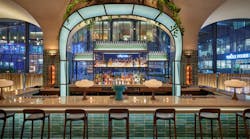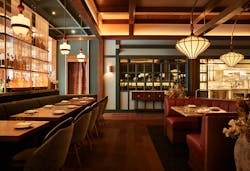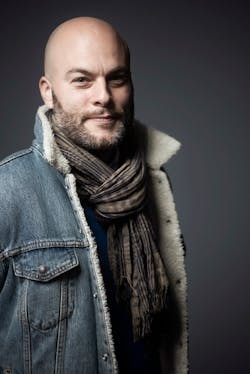In Conversation: IIDA Chats with AvroKO's Chief Creative Officer Nick Solomon
Since its founding in 2001 in New York City, AvroKO has turned hospitality spaces into transformative experiences. Behind some of the most aesthetically pleasing spaces—from bars and restaurants to hotels, retail spaces, and more—the firm's creative process is complex and multifaceted, blending architecture, branding, and experience to produce immersive environments that embrace local culture and history while anticipating future trends. Their priority?: storytelling. To Kristina O’Neal, Adam Farmerie, William Harris and Greg Bradshaw (the award-winning firm’s four founders who started working together as teens) it’s all about connecting with people—emotionally, physically, and psychologically. Their vision comes to life through a diverse team of interior designers, architects, lighting specialists, artists, furniture crafters, and business leaders spanning five offices across the world. Their influences are endless.
The firm's projects range from Chicago’s Hoxton Hotel in the Fulton Market District and Oiji Mi, a Michelin-starred, modern Korean restaurant and bar in New York, to Denver’s historic Union Station (originally built in the late 1800s), Bangkok-based Argentinian restaurant BKK Social Club, and more. AvroKO has set the bar high with the work above and all the rest that has spanned across so many years together. They are more than just a design firm—they are a symbol of innovation and a benchmark for excellence in the design industry.
In an insightful conversation, AvroKO's Chief Creative Officer Nick Solomon provided insight into the beginnings of their "Hospitable Thinking" approach, necessary to foster remarkable experiences and ultimately form more meaningful connections between people, and to their evolution, unique philosophy and strategies for staying relevant in the ever-dynamic field of hospitality design. “Design is an ever-evolving craft, which draws references from the past, present, and dreams of the future,” he says, stressing the importance of real materials, real experiences, and real connections.
Vasia Rigou: Tell us about the firm's beginnings.
Nick Solomon: We’ve always had a passion for the hospitality industry. Our founding partners’ first project was their James Beard Award-winning, Michelin-starred restaurant, PUBLIC, which they both designed and operated for 14 years. Since then, AvroKO has grown to five global offices (New York, San Francisco, Miami, London, and Bangkok), and worked on award-winning projects across 22 countries, all while endeavoring to elevate the hospitality industry through innovative design, carefully-crafted experiences, and environments layered in rich storytelling. With each project, we apply our unique "Hospitable Thinking" approach to create spaces that make an impact across industries.
VR: Tell me more about that trademarked human-centric philosophy of “Hospitable Thinking.”
NS: We bring our philosophy of Hospitable Thinking to all our projects in order to foster remarkable experiences and ultimately form more meaningful connections between people. We believe that hospitality transcends languages and industries, and by understanding and fulfilling these fundamental human needs, brands and businesses can resonate with consumers on a deeper, more profound level.
VR: You create spaces with community at the axis. What parameters do you take into consideration to make it happen?
NS: We integrate timeless core truths, behavioral sciences and environmental psychology to maximize the hospitality experience for all of the spaces we work on. The collection of small moments that make up hospitality experiences, creates a powerful, positive impact on how people feel and leads to a deeper sense of community.
VR: AvroKO has been around for more than 20 years. Can you talk about your vision and how it has evolved over time?
NS: Over the past two decades, we’ve grown AvroKO World from a design firm and hospitality group (AvroKO Hospitality Group) to encompass our partners’ “self-propelled" projects, like our sister studios Brand Bureau, lighting and furniture manufacturer Goodshop Manufacturies and accelerator studio, Hospitable Bridge.
VR: How do you ensure you remain relevant in the dynamic and ever-evolving field of hospitality design?
NS: We are ever-evolving ourselves. AvroKO has always had a spirit of adventure and entrepreneurial curiosity. Connecting with people emotionally, physically and psychologically through our work is a core part of our mission. As we’ve grown as a firm, this idea of “connection” has extended beyond our four partners to our studios and even the end result of the work. We orchestrate experiences that envelop patrons through a combination of design-driven programming and contextual references.
This ultimate goal of connectivity in our design is to ensure that hospitality backdrops are not simply passive reception spaces where people dine or sleep, but that they create emotionally transcendent experiences, however tiny or even subliminal, allowing the energy of the spaces to shift and evolve timelessly.
VR: What kinds of movements are you noticing—from biophilia to cutting-edge technology? And how might these trends have changed post-pandemic?
NS: Design is an ever-evolving craft, which draws references from the past, present and dreams of the future. At the same time, it adapts and responds to social change and context. Post-pandemic, and with the massive exposure through social platforms, we see strong emerging trends such as the huge desire for tailored, individualized experiences across the board, from private meals in incredible settings to private branded island getaways. We are seeing wellness go beyond fitness and encompass a global, general well-being approach to mind and body, including the beginnings of the getaway for medical tourism. Today’s hospitality is about true, authentic experiences, on demand, and perfectly tailored to one’s needs.
NS: Consumers are more savvy and well-versed in global trends than ever. Social media has opened a lens on the world, meaning travelers today expect true, authentic experiences. This reflects in the materiality of design as well. Real materials, locally sourced when possible, or with stories from local contexts, play a big part in creating a true sense of place. People also look for products that have meaning, or do good, like locally sourced items in a guestroom, the coffee in a lobby, or the farmers behind the meal in the restaurant. There is a desire for all parts of the design experience to talk with purpose.
VR: Where do you look for inspiration?
NS: Our talented, global team of designers looks for inspiration in the contexts we work in—the buildings our projects inhabit, the cities and cultures our brands live in, and the aspirations our clients have for their dream projects. At the start of every job, we pull stories, history and anecdotes, and weave these together into a unique and remarkable narrative, which forms the North Star of our designs. This way each one of our projects is unique and true to an authentic sense of place.



